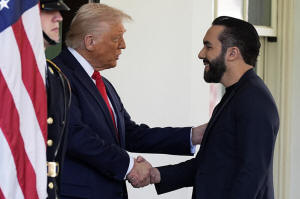El Salvador President Bukele says he won't be releasing a Maryland man
back to the US
[April 15, 2025]
By SEUNG MIN KIM and MARCOS ALEMÁN
WASHINGTON (AP) — President Donald Trump's top advisers and Nayib Bukele,
the president of El Salvador, said Monday that they have no basis for
the small Central American nation to return a Maryland man who was
wrongly deported there last month. Bukele called the idea “preposterous”
even though the U.S. Supreme Court has called on the administration to
“facilitate” Kilmar Abrego Garcia's return.
Trump administration officials emphasized that Abrego Garcia, who was
sent to a notorious gang prison in El Salvador, was a citizen of that
country and that the U.S. has no say in his future. And Bukele, who has
been a vital partner for the Trump administration in its deportation
efforts, said “of course" he would not release him back to U.S. soil.
“The question is preposterous. How can I smuggle a terrorist into the
United States?” Bukele, seated alongside Trump, told reporters in the
Oval Office Monday. “I don't have the power to return him to the United
States."
Should El Salvador want to return Abrego Garcia, the U.S. would
“facilitate it, meaning provide a plane,” Attorney General Pam Bondi
said.
But “first and foremost, he was illegally in our country, and he had
been illegally in our country,” she said. “That’s up to El Salvador if
they want to return him. That’s not up to us.”
In a court filing Monday evening, Joseph Mazzara, the acting general
counsel for the Department of Homeland Security, said it “does not have
authority to forcibly extract” Abrego Garcia from El Salvador because he
is “in the domestic custody of a foreign sovereign nation.”

Mazarra also argued that Abergo Garcia is “no longer eligible for
withholding of removal” because the U.S. designated MS-13 as a foreign
terror organization. Abergo Garcia’s attorneys say the government has
provided no evidence that he was affiliated with MS-13 or any other
gang.
The refusal of both countries to allow the return of Abrego Garcia, who
had an immigration court order preventing his deportation over fears of
gang persecution, is intensifying the battle over the Maryland
resident's future. It has also played out in contentious court filings,
with repeated refusals from the government to tell a judge what it plans
to do, if anything, to repatriate him.
The judge handling the case, Paula Xinis, is now considering whether to
grant a request from the man’s legal team to compel the government to
explain why it should not be held in contempt.
The fight over Abrego Garcia also underscores how critical El Salvador
has been as a linchpin of the U.S. administration’s mass deportation
operation.
How Bukele is helping with Trump’s immigration crackdown
Since March, El Salvador has accepted from the U.S. more than 200
Venezuelan immigrants — whom Trump administration officials have accused
of gang activity and violent crimes — and placed them inside the
country's maximum-security gang prison just outside of the capital, San
Salvador. That prison is part of Bukele's broader effort to crack down
on the country’s powerful street gangs, which has put 84,000 people
behind bars and made Bukele extremely popular at home.
“I want to just say hello to the people of El Salvador and say they have
one hell of a president," Trump said as he greeted Bukele, who was
wearing a black mock turtleneck sans tie.
Bukele struck a deal under which the U.S. will pay about $6 million for
El Salvador to imprison the Venezuelan immigrants for a year.

But Democrats have raised alarm about the treatment of Abrego Garcia and
other migrants who may be wrongfully detained in El Salvador. Democratic
Sen. Chris Van Hollen of Maryland pushed for a meeting with Bukele while
he was in Washington to discuss Abrego Garcia's potential return, and
New Hampshire Sen. Jeanne Shaheen, the top Democrat on the Senate
Foreign Relations Committee, urged the administration to release Abrego
Garcia and others “with no credible criminal record” who were deported
to the maximum-security prison.
“Disregarding the rule of law, ignoring unanimous rulings by the Supreme
Court and subjecting individuals to detention and deportation without
due process makes us less safe as a country,” Shaheen said.
[to top of second column]
|

President Donald Trump greets El Salvador's President Nayib Bukele
as he arrives at the West Wing of the White House, Monday, April 14,
2025, in Washington. (AP Photo/Alex Brandon)

Though other judges had ruled against the Trump administration, this
month the Supreme Court cleared the way for Trump to use the Alien
Enemies Act, an 18th century wartime law, to deport the immigrants.
The justices did insist that the immigrants get a court hearing
before being removed from the U.S. Over the weekend, 10 more people
who the administration claims are members of the MS-13 and Tren de
Aragua gangs arrived in El Salvador, Secretary of State Marco Rubio
said Sunday.
Trump wants to expand his deportation plans
The president has said openly that he would also favor El Salvador
taking custody of American citizens who have committed violent
crimes, a view he repeated Monday.
“We have bad ones too, and I'm all for it because we can do things
with the president for less money and have great security,” Trump
said during the meeting. “And we have a huge prison population.” It
is unclear how lawful U.S. citizens could be deported elsewhere in
the world.
Before the press entered the Oval Office, Trump said in a video
posted on social media by Bukele that he wanted to send “homegrowns”
to be incarcerated in El Salvador, and added that “you’ve got to
build five more places,” suggesting Bukele doesn’t have enough
prison capacity for all of the U.S. citizens that Trump would like
to send there.
The high court weighs in, and the administration response
The Supreme Court has called for the Trump administration to
“facilitate” the return of Abrego Garcia.
Trump indicated over the weekend that he would return Abrego Garcia
to the U.S. if the high court’s justices said to bring him back,
saying “I have great respect for the Supreme Court.” But the tone
from top administration officials was sharply different Monday,
“He's a citizen of El Salvador,” said Stephen Miller, a White House
deputy chief of staff. “So it's very arrogant, even for American
media, to suggest that we would even tell El Salvador how to handle
their own citizens.”

Bondi asserted that two immigration court judges — who are under
Justice Department purview — found that Abrego Garcia was a member
of MS-13. The allegation is based on a confidential informant’s
claim in 2019 that Abrego Garcia was a member of a chapter in New
York, where he has never lived.
How Bukele is viewed back home
While Bukele's crackdown on gangs has popular support, the country
has lived under a state of emergency that suspends some basic rights
for three years. He built the massive prison, located just outside
San Salvador in the town of Tecoluca, to hold those accused of gang
affiliation under his crackdown.
Part of his offer to receive the Venezuelans there was that the U.S.
also send back some Salvadoran gang leaders. In February, his
ambassador to the U.S., Milena Mayorga, said on a radio program that
having gang leaders face justice in El Salvador was “an issue of
honor.”
Populists who have successfully crafted their images through media,
Bukele and Trump are of different generations but display similar
tendencies in how they relate to the press, political opposition and
justice systems in their respective countries.
Bukele came to power in the middle of Trump’s first term and had a
straightforward relationship with the U.S. leader. Trump was most
concerned with immigration and, under Bukele, the number of
Salvadorans heading for the U.S. border declined.
Bukele’s relationship with the U.S. grew more complicated at the
start of the Biden administration, which was openly critical of some
of his antidemocratic actions. Trump has also shown some irritation
with Bukele in the past, accusing El Salvador of lowering its crime
rate by sending people to the U.S.
___
Alemán reported from San Salvador, El Salvador. Associated Press
writers Michael Kunzelman and Chris Megerian in Washington, and
Darlene Superville in West Palm Beach, Florida, contributed
reporting.
All contents © copyright 2025 Associated Press. All rights reserved |